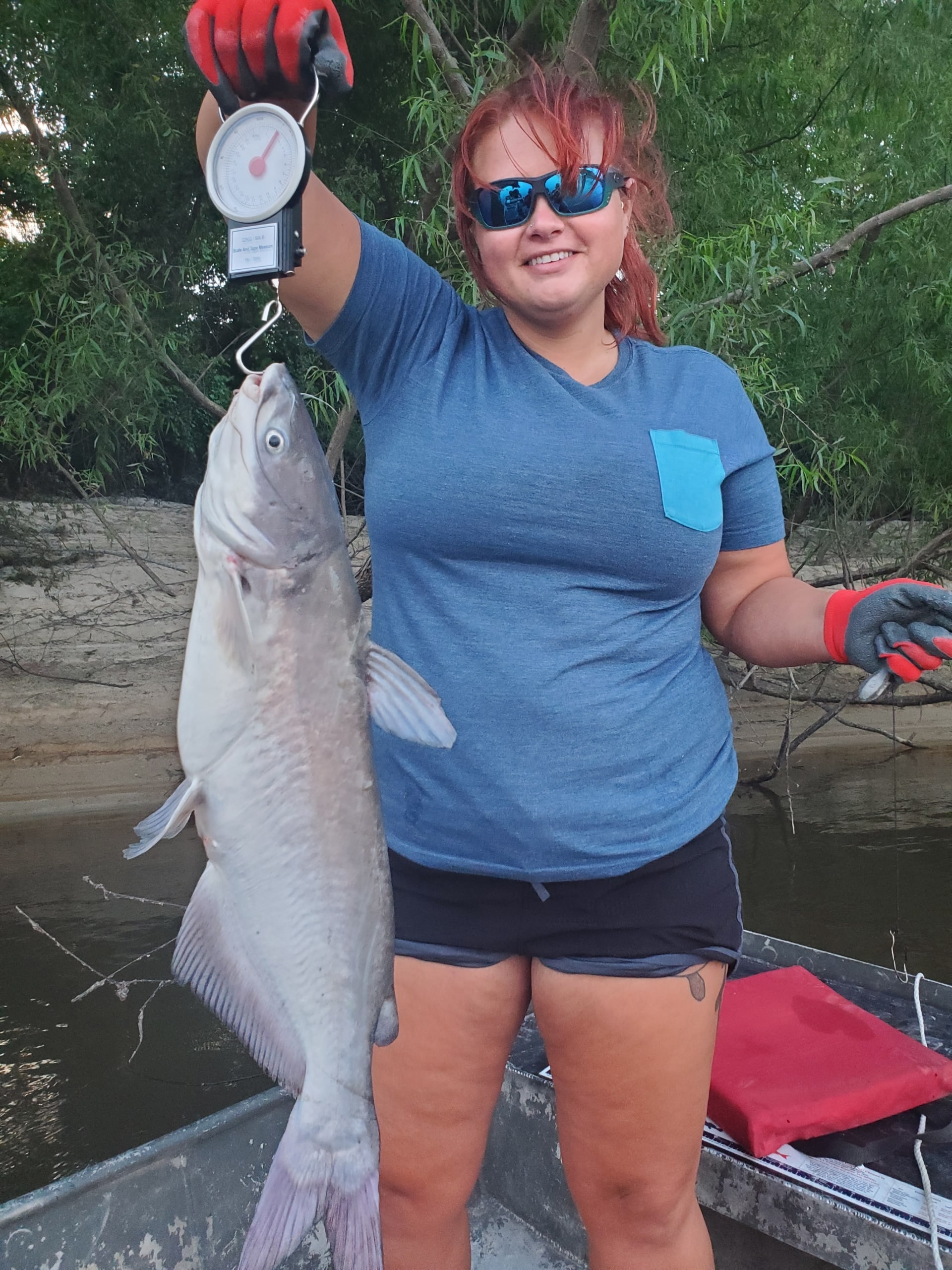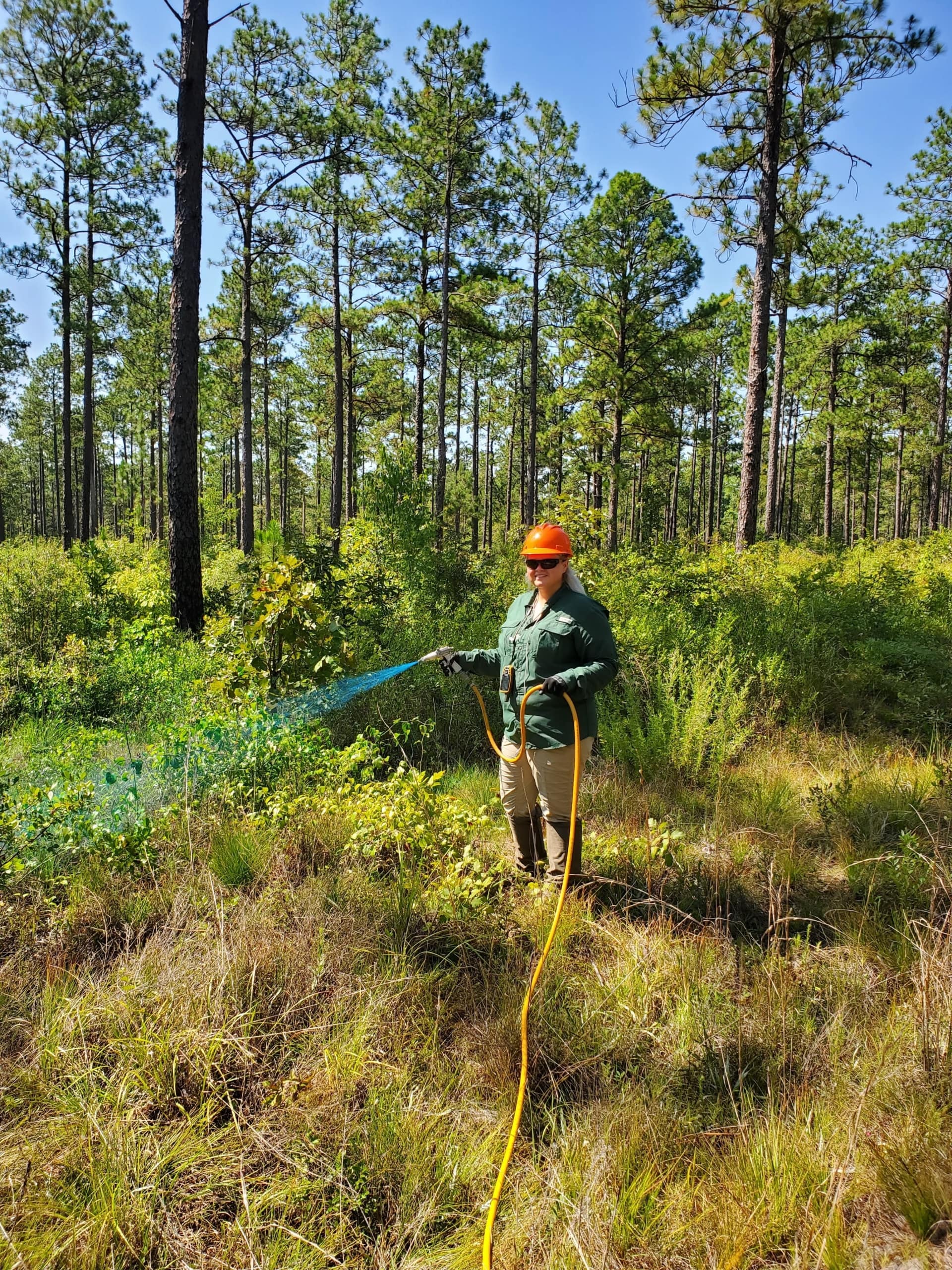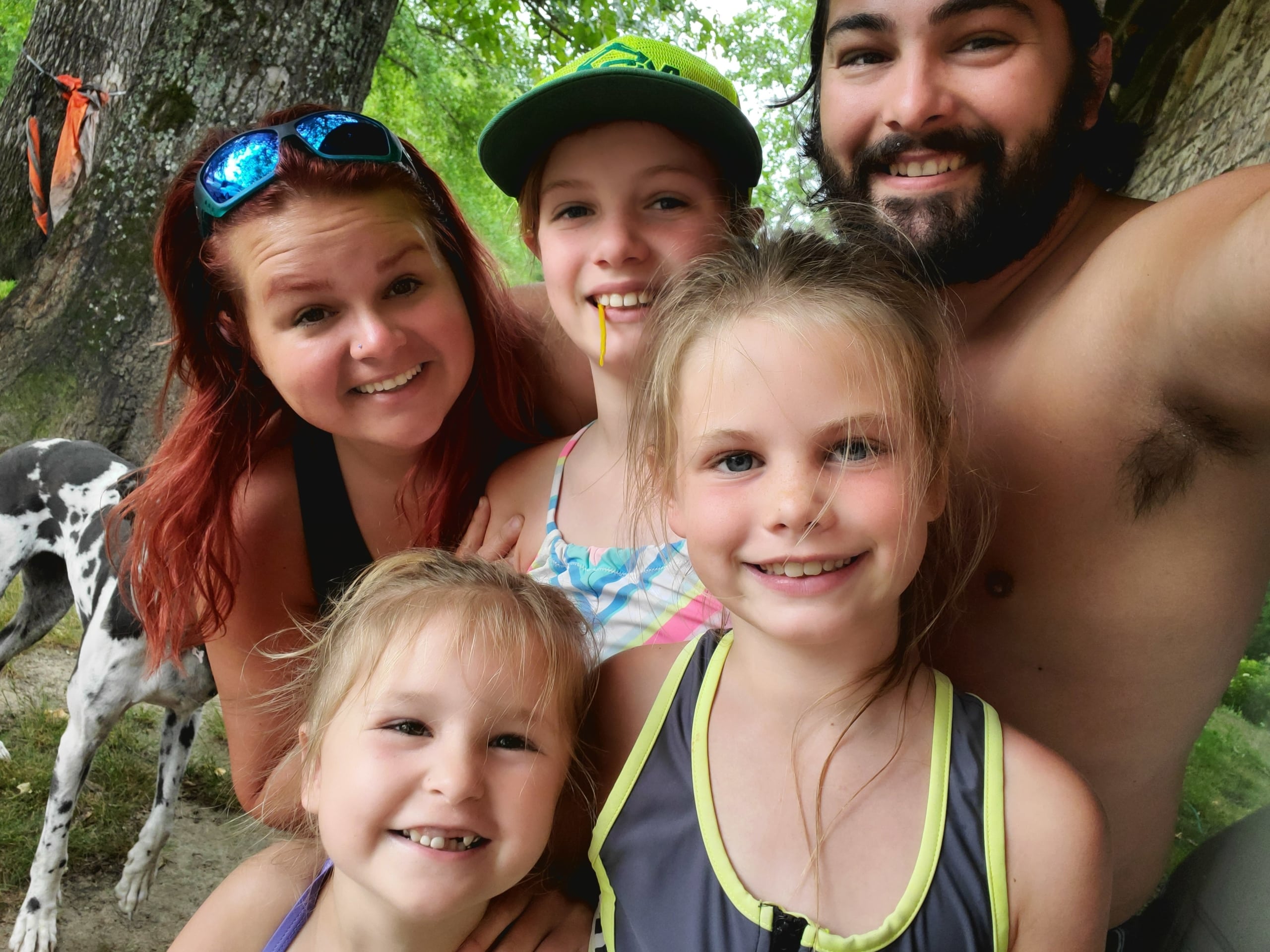 By Sydni Dobson
By Sydni Dobson
Meet Elanna Thompson, a Resource Assistant Program (RAP) intern through The Corps Network.
RAP is a USDA Forest Service program that provides a rigorous and immersive internship experience for those interested in career opportunities with land management agencies. Resource Assistants (RAs) are recruited by partner organizations – such as The Corps Network and our member Corps – and work under the supervision of Forest Service staff to accomplish mission-critical work. Elanna Thompson was recruited by CLIMB Community Development Corporation (CDC).
Before joining RAP in November 2019, Elanna attended graduate school at University of Southern Mississippi (USM), continuing her studies in biology in pursuit of attending medical school. After realizing grad school wasn’t the perfect fit, Elanna’s co-worker mentioned a RAP internship on the Desoto National Forest.
Thrilled with the idea of being outdoors and working with the environment, Elanna applied for the position and was hired. Fast forward to almost a year later, Elanna is thankful for working closely with the Forest Service and all that they’ve introduced to her. Learn more about Elanna’s journey to RAP and her experience as an intern.
Q: What interested you in joining RAP?
A: I was in grad school at USM and it wasn’t a good fit for me, and I wasn’t a good fit for them. When I left, I heard about a temporary position on the Chickasawhay District and I applied. At first, they told me they already filled the position, but I called them so much – and aggravated them – that they ended up calling back and offering me a position.
I worked there for two months, just kind of helping out – pretty much doing whatever they needed me to do. Then one of the ladies that worked in the office informed me about a RAP internship on the DeSoto. I applied and called them a lot, so that they could know my name and face. Eventually, they selected me, and I started the program in November 2019, and I have enjoyed it. I get paid to do something that I would do for free – that’s a win-win for me. I love to be outside and I find so many cool things just in the course of my job.
I recently read something in an article about micro goals. You write down things that make you instantly happy or that you enjoy, and they’ll make your whole day. Finding different mushrooms or different plants outside – those are my personal goals and I get gratified every day.
Even though I’m an intern, the Forest Service is very family-conscious: anytime my kids need to be checked out early or they were sick, or I was sick – they were extremely supportive and understanding. That a good employee is allowed to have the time they need to take care of their family, it ends up making [the employee] work harder for the agency; I’m really impressed with that so far. Also, with CLIMB and The Corps Network – I love how everyone knows what’s really important.
Q: What were you doing before you joined RAP?
A: I was a grad student at USM. I got my bachelor’s from there in biological sciences. I love USM; they have a great program. However, I had recently gotten a divorce and was at a mentally tough place in my life. Grad school was not very forgiving, and I guess it’s just the nature of the beast. It just wasn’t working for me being a single mom, I knew I had to find something else. Also, the pay is absolutely atrocious. As a grad student, I was doing DNA extraction in a shark and ray lab. It was really cool and mentally stimulating, but I was inside all day long and it really just wasn’t a good fit for me. With the RAP internship, it allowed me to blossom and really enjoy myself and my life. I know that sounds really cheesy, but it is true.
Q: What internship or work experience have you had before joining RAP?
A: Yes, I had a couple. I did summer internships with my professors and I’ve done a lot of field work. I studied tropical ecology in Belize. I did an internship with [an organization called] My Brother’s Keeper at a clinic in Jackson. We worked with people who didn’t have access to healthcare and helped them get access to STD testing, education, etc.
I really enjoyed that and that was a part of my life where I really thought I wanted to go to medical school. But at that point, I figured out that knowing you don’t like something was just as important as knowing you do. In working at that clinic, it made me realize that the heavy responsibility was something that I’m not equipped to handle. I’m very thankful for going through that internship. I had a lot of fun and met a lot of really cool people. But I realized that the medical field was not for me there.
You mentioned that you studied tropical ecology in Belize. Can you tell us more about that experience?
During undergrad, I took a tropical ecology course in Belize for two weeks. Prior to studying abroad, we took a class for a semester studying the places we were going and all that we’d be doing there. I did that after the internship with My Brother’s Keeper. And that kind of cemented and helped me realize that wildlife and studying the global ecosystem is what I wanted to do. I snorkeled in the cayes – islands outside of Belize. We went on mountain hikes and backpacked. We stayed in little lodges, where there was no electricity most of the time. It was really interesting to get back to an environment where there really isn’t much technology. It makes you appreciate technology and sort of wish that it wasn’t around. I could probably talk for hours on all of the things that I’ve learned there.
Q: What kind of work are you doing in your current role?
A: I’m mainly in the recreation program, but if other departments need me, they can pull me and ask for me during the day. Most of the time, what we do is if someone has trash or if something needs cleaning or needs to be picked up, I’ll go do that. I also help keep the ranch areas clean and orderly.
One thing that I’ve been doing recently is an operation and management plan for rec areas. I’m doing one for the shooting range right now. That’s sort of giving me a head start on how to keep up with Forest Service paperwork, because it can be kind of daunting. There’s a lot of paperwork when you deal with large government agencies – they want everything documented.
Another thing is that I meet the kids that come from the GulfCorps program. I help them with the work they’re doing on the district. I serve as a guide, making sure that they get where they’re supposed to be and stuff like that.
I have helped spray for non-native invasive species. I have checked RCW, which is red cockaded woodpecker clusters and documented starts to new holes. Another time, I helped mark out gopher tortoise burrows before they would go in and log. Gopher tortoises can only get in so many feet of the burrows, when they’re logging.
Next month, I’ll be assisting with an archeological survey. My direct supervisor here on the DeSoto is actually the archeologist. We have done several digging surveys, where you just go and pick up a random square in the area and see if you can find any arrowheads. I’ve found some points and scrapers. We found some pottery before. It’s really fascinating, because I grew up literally right down the road. To touch something that could’ve been touched by my ancestors is really interesting.

Q: So far, what has been your favorite part about the program?
A: I’m the type of person where I enjoy working by myself a lot. I know this might sound weird, but I really like that if I’m having an off day, I can just get lost in the forest and do what I’m supposed to be doing. I can just go and row a rec area or walk down one of the hiking trails and make sure [there’s] nothing dangerous [and there’s] no trash. Just everything.
Another fun moment that I really enjoyed was attending The Corps Network’s annual conference in Washington, DC. I got so many new ideas on ways that Corps can work on our district. I have a lot of ideas of how to bring local Corps in. Cause when I was in Washington, I saw how in California, they have such a huge labor force of young people and they get to learn so much and we need that desperately in the South. Our young people want to do something. They just don’t have the opportunity all the time. This is something that is very much on my heart.
Q: What are some of the challenges of the program?
A: I don’t want to beat a dead horse, but I’m the only girl out here. It helps that I grew up here, and most of the guys that I work with have very similar thinking to people I grew up with. I know how to sort of blend in. But I was pleasantly surprised to find that a lot of them are very open-minded.
But it can be a challenge, because I mean there are things I can’t do. There are things I can’t help out with. Some of it is because I don’t have the training or equipment, but there are literally things that some of the guys can do and I can’t, cause I’m a female and that’s okay. But it does get annoying sometimes. Trying to get people to see you as a person, not a woman, is difficult sometimes.
Q: Have you gained new skills or earned certifications?
A: Yes, I have my government driver’s license and first responder certification. I also have a lot of fire qualifications. I’ve taken about three different fire courses and I’m currently working on passing my pack test. I know how to use most of the equipment out here, unless it’s like, heavy equipment.
Q: Do you feel like you’ve learned anything about yourself?
A: I definitely feel like this is a more grown-up work environment. In academia, I feel like when you work for a university, the mindset is always 20-something. I feel like this is a more grown-up place to work, and I’ve learned how to navigate office politics. Which is something that I’ve never encountered before. It has pushed and helped me realize what I want out of my life. Which is something that a lot of people struggle with, and I feel like having that question answered gives you so much peace.
“I get paid to do something that I would do for free – that’s a win-win for me. I love to be outside and I find so many cool things just in the course of my job.”
Q: Tell us about some of the people you’ve met or connections you’ve made during your program experience.
A: I got to meet most of the…leadership on the district. I really like Deputy Ranger Chandra Roberts – she has helped me and tried her best to teach me how to fit in here and know what’s good and what’s not good. My mentor Robert Reams was a great boss to me as well. There was one instance where I met a guy at one of the fire classes. I didn’t recognize him at first, and we just started talking about genetics and other stuff, however he turned out to be the Regional Genetics Director for the Harrison Experimental Forest. After our conversation, we exchanged contact information and he reached out to me about an opening at their facility. I got to go down there and extract some DNA for a project they’re doing with conifers. It was fun to be back in the lab for a week.
Q: What is your plan following this RAP internship?
A: One day I would like to be a ranger. But you can’t necessarily go straight to that, and I love the wildlife program. When the wildlife technician position became available here, I applied. I’m hoping it will get my foot in the door as it’s a permanent position. It will kind of set me up for where I’m going next. It’s only been two years since I got divorced, and it’s kind of hard to bounce back from that financially, so I wasn’t ready to move. I’m hoping that I get this position, because I’ll be right back here at home and it will give me some time to save up and be ready for a big move.
Q: What advice would you give to others who are considering a program like this?
A: They’re very competitive. I think it was like 300 people that applied for this position, and the reason why is because the position itself is so great. I would love if they could open up another one here. With that being said, sometimes when you compete for a spot really hard, you think it’s going to be a certain way. But this is a hard job – like literally manual labor. If you do not like to sweat or you like to be in the air conditioner – don’t apply.
You just really need to be ready for a lot of hard work and I personally think that it builds character. I feel good when I’ve had a hard days’ work. It’s a different kind of good feeling than if you’re working on a computer – which is something that can be important and also mentally stressful. But I’d say the biggest component of this position here on the DeSoto is pretty intense manual labor. Not every day – I’d say one day a week is hard, and the rest is moderate. I’d say that if you want to, try to get in touch with previous RAP interns and speak to them. Make sure before you go all in. The worst thing is someone who gets the position and they don’t appreciate it, cause it’s not what they thought it was. And to get it and not even try is disrespectful to all the people who wanted the position. Just make sure it’s something you want to do.
Q: If you could describe your RAP experience in one sentence, what would you say?
A: Challenging, but rewarding. This position wasn’t just handed to me. They expected me to work from day one, but it’s so rewarding. Just being able to see the difference I make on the district; it means everything to me.

Q: Is there anything else you’d like to add?
A: I would like to tell The Corps Network and CLIMB, thank you. Thank you for taking a chance on me. Originally, I didn’t think I was going to get this RAP position. It has truly made all the difference for me and my little girls. I’m not entirely sure where we’d be right now if I hadn’t gotten this position. I’m really grateful.





































































